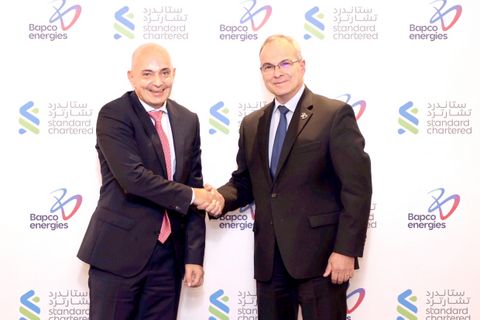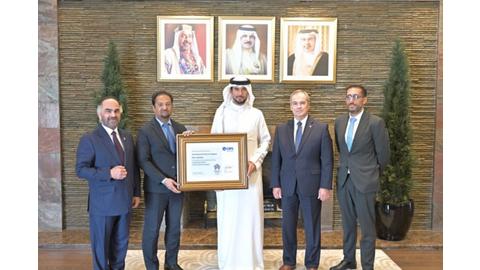Bapco Energies commits to net-zero indirect emissions by 2060

Bapco Energies has committed to achieving net-zero indirect emissions by 2060 under a sustainability-linked finance framework.
Developed in close collaboration with Standard Chartered, which acted as the company’s environmental, social, and governance (ESG) adviser in the process, the framework will allow the company to link its financing with decarbonisation goals.
As part of the framework, the national energy company of the kingdom has disclosed detailed emissions targets under the ‘Scope 3’ definition, which unlike ‘Scope 1 and 2’ are not directly related to its operations.
The Scope 3 targets include emissions from the transportation of goods and services, the use of sold products, and the generation of purchased electricity.
In the framework, Bapco Energies lists its ‘Scope 1 and 2’ net emissions intensity reduction targets, using 2017 as a baseline: 15 per cent by 2025, 25pc by 2030, 50pc by 2040, 75pc by 2050; and reaching net zero by 2060.
The company has also pledged to reducing absolute ‘Scope 1 and 2’ emissions by 30pc from 2017 levels by 2035.
For its landmark Scope 3 targets, Bapco Energies will reduce absolute emissions within Bahrain by 30pc from 2017 levels by 2035; and by 2060, reach net-zero.
Under the framework, Bapco Energies will be able to tap into the emerging ESG investor and lender base in a robust and transparent manner.
With Standard Chartered’s support, the framework received a ‘Second Party Opinion’ from ISS confirming its alignment with the ICMA Sustainability-Linked Bond Principles (SLBP) and the LMA Sustainability-Linked Loan Principles (SLLP).
Typically provided by third-party organisations such as ISS, it is an independent assessment of the environmental and social quality of a green bond or sustainability bond.
According to experts, energy companies looking to offset their carbon emission can directly invest in renewable energy, energy efficiency, forestry and methane capture and destruction projects that reduce greenhouse gas emissions.
They can also purchase carbon credits through intermediaries such as carbon offset exchanges.
Commenting on the initiative, Bapco Energies Group chief executive Mark Thomas said: “We are proud to have published our ‘Sustainability-Linked Finance Framework’ and ‘Second Party Opinion’ from ISS. Disclosing our detailed and ambitious decarbonisation targets makes us the first national energy company to implement this practice setting a global benchmark in the energy sector.”
He added: “Transparency in sharing these targets allows us to play our part in addressing the global climate crisis more effectively, and we are committed to actively contributing to global and local sustainability agendas. This announcement underlines our commitment to deliver a commercially viable energy transition to support the kingdom’s efforts of achieving net-zero by 2060.”
Also commenting was Dr Boutros Klink, Standard Chartered chief executive for Bahrain and Middle East (excluding the UAE), who said: “We commend Bapco Energies for its undertaking of this framework and for leading the way among national energy companies in setting ambitious emission reduction targets that will contribute to efforts that seek to mitigate climate change. At Standard Chartered, we are committed to supporting our clients across our dynamic footprint as they venture into the sustainable finance market to meet their ESG ambitions.”
Dr Klink added: “We are proud to have been part of Bahrain’s economic growth for the last 100 years and hope to continue to be for the next 100 years and beyond.”
The bank continues to make and update sustainable finance commitments and has set a number of targets, including mobilising $300 billion in sustainable finance by December 2030; achieving $1bn in Sustainable Finance income by 2025; and aiming to reduce the emissions associated with financing activities to net zero by 2050.
avinash@gdnmedia.bh


